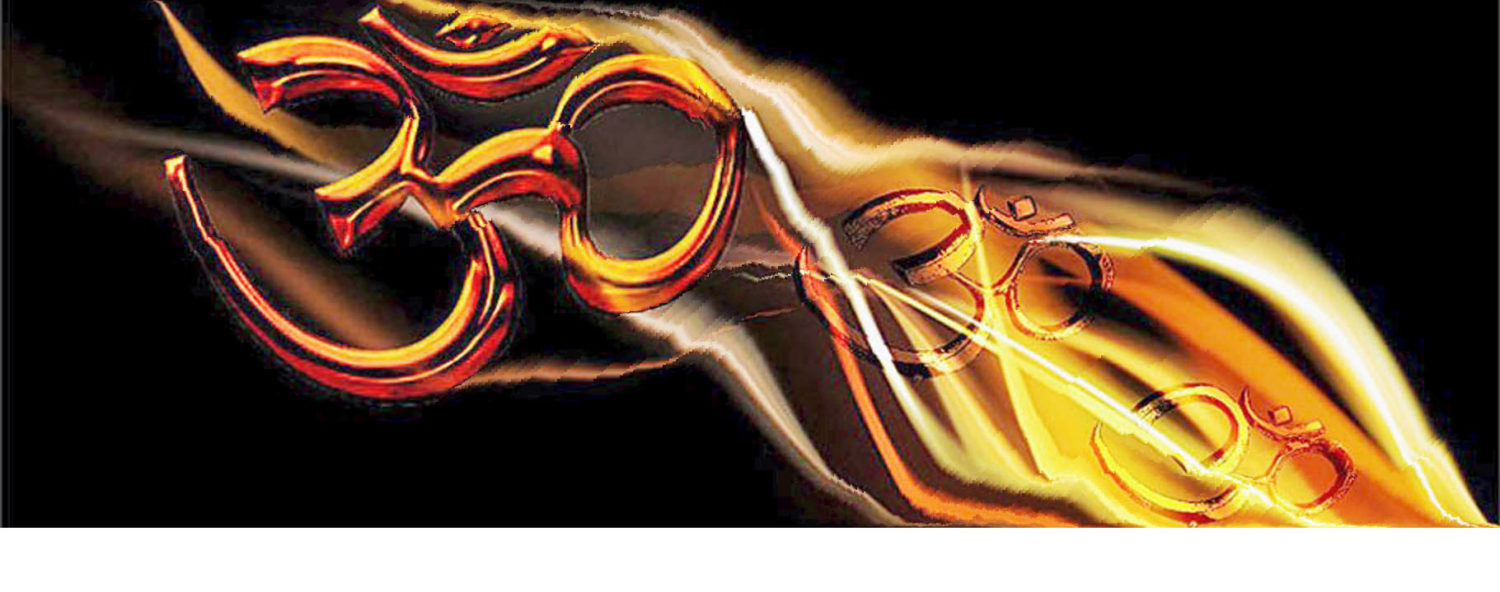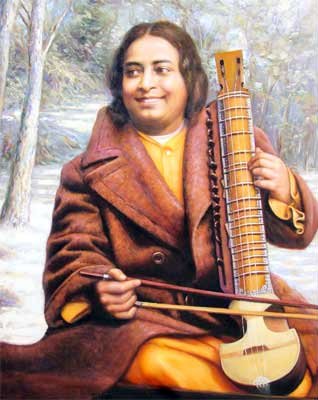Sages

Guidance Of Sages & Scriptures of India
GUIDANCE FOR MEDITATION AND LIFE


Sages


Just as every action that emanates from us comes back to us as reaction, even so our actions may act on other people and theirs on us. Perhaps all of you have observed it as a fact that when persons do evil actions, they become more and more evil, and when they begin to do good, they become stronger and stronger and learn to do good at all times. This intensification of the influence of action cannot be explained on any other ground than that we can act and react upon each other.
To take an illustration from physical science, when I am doing a certain action, my mind may be said to be in a certain state of vibration; all minds which are in similar circumstances will have the tendency to be affected by my mind. If there are different musical instruments tuned alike in one room, all of you may have noticed that when one is struck, the others have the tendency to vibrate so as to give the same note. So all minds that have the same tension, so to say, will be equally affected by the same thought. Of course, this influence of thought on mind will vary according to distance and other causes, but the mind is always open to affection.
Suppose I am doing an evil act, my mind is in a certain state of vibration, and all minds in the universe, which are in a similar state, have the possibility of being affected by the vibration of my mind. So, when I am doing a good action, my mind is in another state of vibration; and all minds similarly strung have the possibility of being affected by my mind; and this power of mind upon mind is more or less according as the force of the tension is greater or less.
Following this simile further, it is quite possible that, just as light waves may travel for millions of years before they reach any object, so thought waves may also travel hundreds of years before they meet an object with which they vibrate in unison. It is quite possible, therefore, that this atmosphere of ours is full of such thought pulsations, both good and evil. Every thought projected from every brain goes on pulsating, as it were, until it meets a fit object that will receive it. Any mind which is open to receive some of these impulses will take them immediately. So, when a man is doing evil actions, he has brought his mind to a certain state of tension and all the waves which correspond to that state of tension, and which may be said to be already in the atmosphere, will struggle to enter into his mind. That is why an evil-doer generally goes on doing more and more evil. His actions become intensified.
Such also will be the case with the doer of good; he will open himself to all the good waves that are in the atmosphere, and his good actions also will become intensified. We run, therefore, a twofold danger in doing evil: first, we open ourselves to all the evil influences surrounding us; secondly, we create evil which affects others, may be hundreds of years hence. In doing evil we injure ourselves and others also. In doing good we do good to ourselves and to others as well; and, like all other forces in man, these forces of good and evil also gather strength from outside.
Therefore, we should only do good actions and not evils actions, because good actions do good for ourselves and others, while evil actions do evil for ourselves and others.
Complete-Works / Volume 1 / Karma-Yoga / CHAPTER VI
NON-ATTACHMENT IS COMPLETE SELF-ABNEGATION

“And forgive us our debts, as we forgive our debtors.” A Hindu or a Buddhist would read the “debts” in this passage as the debts of Karma. The word Karma stands for a mental or physical act and its consequences. Any thought we think, any action we perform has two consequences: first, it creates an impression in the mind, which means that we are sowing a seed for similar thoughts and actions in the future; second, it brings, according to the nature of the thought or deed, either happiness or misery. By our actions and reactions we are always contracting debts, obligations that must be paid off. We alone are responsible for these obligations. We are even responsible for our own character, which has resulted from our habits of thought and action. When we recognize our debts, when we realize that everything, good or bad, that comes to us has been previously earned by ourselves alone, then we know that we must not hold anybody else responsible for anything that we suffer.
We all have a tendency to accuse others for whatever in our life may go wrong. At the beginning of creation we find Adam blaming Eva for their fall, And Eve, in her turn, blaming the serpent. If we are ready to assume responsibility far our own karma and not blaming others, then it will be easy for us to forgive those in debt to us, those who take something away from us or do us some harm. Only when we have this forgiveness in our hearts can we forgive ask expect forgiveness from God.
What binds us to the law of karma, the law of cause and effect? Our sense of ego, which makes us feel separate from God. In the Svetasvatara Upanishad we read:
This vast universe is a wheel. Upon it are all creatures that are subject to birth, death, and rebirth. Round and round it turns, and never stops. It is the wheel of Brahman. As long as the individual self thinks it is separate from Brahman, it revolves upon the wheel in bondage to the laws of birth, death and rebirth. But when through the grace of Brahman it realizes its identity within Him, it revolves upon the wheels no longer. It achieves immortality.
In order to free ourselves from the bondage of karma we must offer the fruits of our actions to the Lord and surrender our sense of ego to Him. We must pray to God for forgiveness of our debts so that, Through his grace, we may transcend karma an reach union with him.
Transcending the past
For if ye forgive men their trespasses,
Your heavenly Father Will also forgive you;
But if ye forgive not men their trespasses,
Neither will your Father forgive your trespasses.
Until we become established in the virtue of forgiveness, we cannot attain purity of heart which enables us to seek God. The practice of forgiveness is therefore of fundamental importance for the spiritual aspirant. In the Sermon on the Mount, Christ stresses this practice repeatedly. He teaches mercy, reconciliation, and forgiveness of debts. But besides the Sermon, the Gospels record many instances of Christ’s teaching of forgiveness, both by precept and by his own example.
When Peter asked him, “Lord, How often shall my brother sin against me, and I forgive him? Till seven times? Christ answered,”I say not unto thee, until seven times, but until seventy times seven.“
In his own life Christ did not harbor the least resentment toward those who had done wrong. He would bless them saying, “Go and sin no more. Thy sins are forgiven.” And in his prayer on the cross he asked the Father to pardon the ignorance of men, “for they know not what they do“.
All great spiritual teachers have emphasized the importance of forgiveness in spiritual life. Buddha said,“If a man foolishly does me wrong, I will return to him the protection of my ungrudging love; the more evil comes from him, the more good shall go from me.… Cleanse your heart of malice and cherish no hatred, not even against your enemies; but embrace all living beings with kindness.”
These teachers agree that if we lack forgiveness, If we hold thoughts of anger or hatred, we will cause misery for ourselves as well as for others. They advise us to raise opposite waves all pot of thought – thoughts off Love and compassion – so that we will be at peace with the world and ourselves.
Why is it so difficult for most of us to follow the teaching of forgiveness? Because when someone cherishes ill-will towards us, we react by feeling hurt. And what is hurt the most? The ego. Forgiveness is perhaps the greatest of all virtues, because if we can truly forgive men their trespasses we rise above the ego, which obstructs our vision of God.
Swami Prabhavananda

Questioner: I am not well. I feel rather weak. What am I to do?
Maharaj: Who is unwell, you or the body?
Q: My body, of course.
M: Yesterday you felt well. What felt well?
Q: The body.
M: You were glad when the body was well and you are sad when the body is unwell. Who is glad one day and sad the next?
Q: The mind.
M: And who knows the variable mind?
Q: The mind.
M: The mind is the knower. Who knows the knower?
Q: Does not the knower know itself?
M: The mind is discontinuous. Again and again it blanks out, like in sleep or swoon, or distraction. There must be something continuous to register discontinuity.
Q: The mind remembers. This stands for continuity.
M: Memory is always partial, unreliable and evanescent. It does not explain the strong sense of identity pervading consciousness, the sense ‘I am’. Find out what is at the root of it.
Q: However deeply I look, I find only the mind. Your words ‘beyond the mind’ give me no clue.
M: While looking with the mind, you cannot go beyond it. To go beyond, you must look away from the mind and its contents.
Q: In what direction am I to look?
M: All directions are within the mind! I am not asking you to look in any particular direction. Just look away from all that happens in your mind and bring it to the feeling ‘I am’. The ‘I am’ is not a direction. It is the negation of all direction. Ultimately even the ‘I am’ will have to go, for you need not keep on asserting what is obvious. Bringing the mind to the feeling ‘I am’ merely helps in turning the mind away from everything else.
Q: Where does it all lead me?
M: When the mind is kept away from its preoccupations, it becomes quiet. If you do not disturb this quiet and stay in it, you find that it is permeated with a light and a love you have never known; and yet you recognize it at once as your own nature. Once you have passed through this experience, you will never be the same man again; the unruly mind may break its peace and obliterate its vision; but it is bound to return, provided the effort is sustained; until the day when all bonds are broken, delusions and attachments end and life becomes supremely concentrated in the present.
Q: What difference does it make?
M: The mind is no more. There is only love in action.
Q: How shall I recognize this state when I reach it?
M: There will be no fear.
Q: Surrounded by a world full of mysteries and dangers, how can I remain unafraid?
M: Your own little body too is full of mysteries and dangers, yet you are not afraid of it, for you take it as your own. What you do not know is that the entire universe is your body and you need not be afraid of it. You may say you have two bodies; the personal and the universal. The personal comes and goes, the universal is always with you. The entire creation is your universal body. You are so blinded by what is personal, that you do not see the universal. This blindness will not end by itself — it must be undone skilfully and deliberately. When all illusions are understood and abandoned, you reach the error-free and perfect state in which all distinctions between the personal and the universal are no more.
Q: I am a person and therefore limited in space and time. I occupy little space and last but a few moments; I cannot even conceive myself to be eternal and all-pervading.
M: Nevertheless you are. As you dive deep into yourself in search of your true nature, you will discover that only your body is small and only your memory is short; while the vast ocean of life is yours.
Q: The very words ‘I’ and ‘universal’ are contradictory. One excludes the other.
M: They don’t. The sense of identity pervades the universal. Search and you shall discover the Universal Person, who is yourself and infinitely more.
Anyhow, begin by realizing that the world is in you, not you in the world.
Q: How can it be? I am only a part of the world. How can the whole world be contained in the part, except by reflection, mirror like?
M: What you say is true. Your personal body is a part in which the whole is wonderfully reflected. But you have also a universal body. You cannot even say that you do not know it, because you see and experience it all the time. Only you call it ‘the world’ and are afraid of it.
Q: I feel I know my little body, while the other I do not know, except through science.
M: Your little body is full of mysteries and wonders which you do not know. There also science is your only guide. Both anatomy and astronomy describe you.
Q: Even if I accept your doctrine of the universal body as a working theory, in what way can I test it and of what use is it to me?
M: Knowing yourself as the dweller in both the bodies you will disown nothing. All the universe will be your concern; every living thing you will love and help most tenderly and wisely. There will be no clash of interests between you and others. All exploitation will cease absolutely. Your every action will be beneficial, every movement will be a blessing.
Q: It is all very tempting, but how am I to proceed to realize my universal being?
M: You have two ways: you can give your heart and mind to self-discovery, or you accept my words on trust and act accordingly. In other words, either you become totally self-concerned, or totally un-self-concerned. It is the word ‘totally’ that is important. You must be extreme to reach the Supreme.
Q: How can I aspire to such heights, small and limited as I am?
M: Realize yourself as the ocean of consciousness in which all happens. This is not difficult. A little of attentiveness, of close observation of oneself, and you will see that no event is outside your consciousness.
Q: The world is full of events which do not appear in my consciousness.
M: Even your body is full of events which do not appear in your consciousness. This does not prevent you from claiming your body to be your own. You know the world exactly as you know your body – through your senses. It is your mind that has separated the world outside your skin from the world inside and put them in opposition. This created fear and hatred and all the miseries of living.
Q: What I do not follow is what you say about going beyond consciousness. I understand the words, but I cannot visualize the experience. After all, you yourself have said that all experience is in consciousness.
M: You are right, there can be no experience beyond consciousness. Yet there is the experience, of just being. There is a state beyond consciousness, which is not unconscious. Some call it super-consciousness, or pure consciousness, or supreme consciousness. It is pure awareness free from the subject-object nexus.
Q: I have studied Theosophy and I find nothing familiar in what you say. I admit Theosophy deals with manifestation only. It describes the universe and its inhabitants in great details. It admits many levels of matter and corresponding levels of experience, but it does not seem to go beyond. What you say goes beyond all experience. If it is not experienceable, why at all talk about it?
M: Consciousness is intermittent, full of gaps. Yet there is the continuity of identity. What is this sense of identity due to, if not to something beyond consciousness?
Q: If I am beyond the mind, how can I change myself?
M: Where is the need of changing anything? The mind is changing anyhow all the time. Look at your mind dispassionately; this is enough to calm it. When it is quiet, you can go beyond it. Do not keep it busy all the time. Stop it – and just be. If you give it rest, it will settle down and recover its purity and strength. Constant thinking makes it decay.
Q: If my true being is always with me, how is it that I am ignorant of it?
M: Because it is very subtle and your mind is gross, full of gross thoughts and feelings. Calm and clarify your mind and you will know yourself as you are.
Q: Do I need the mind to know myself?
M: You are beyond the mind, but you know with your mind. It is obvious that the extent, depth and character of knowledge depend on what instrument you use. Improve your instrument and your knowledge will improve.
Q: To know perfectly I need a perfect mind.
M: A quiet mind is all you need. All else will happen rightly, once your mind is quiet. As the sun on rising makes the world active, so does self-awareness affect changes in the mind. In the light of calm and steady self-awareness inner energies wake up and work miracles without any effort on your part.
Q: You mean to say that the greatest work is done by not working?
M: Exactly. Do understand that you are destined for enlightenment. Cooperate with your destiny, don’t go against it, don’t thwart it. Allow it to fulfil itself. All you have to do is to give attention to the obstacles created by the foolish mind.
I Am That
A Quiet Mind is All you Need
Item 65

He attains peace who knows Me as the friend of all beings, as the enjoyer of all sacrifices and penances, and as the Overlord of the entire universe. (Bhagavad Gita V:29)
If our conception of God is a terrible entity of whom we have to be constantly afraid, there can be no peace or happiness, as the element of fear, a state of unpleasant unrest, will be present. God has, therefore, to be accepted as a friend, well-wisher, deeply interested in our welfare. If we have the confident belief that we have such a friend in God, there is no need to tell him about our wants as he is omniscient and knows what it is good for us, and is sure to look after our welfare without any request from us.
As God is omnipotent, that is no need to doubt his ability to help us in every way. As he is omnipresent, we have no need to seek him out elsewhere than in our own marks hearts where He is ever present, regulating every thought wave of ours. In fact, he is even in our stomach looking after the digestion of the food we send there.
Having become(the fire), I abide in the body of beings, associated with prana and apana, digest the fourfold food. (Geeta XV: 14).
If we recognize the existence of such a friend, it will give us strength and mental equilibrium, which are quite necessary for a state of peace.
All–Inclusive Love
But it is only proper to remind ourselves that though God is certainly our friend, he is not only our friend but the friend of all created beings. If we think of hurting any other being, he will remind us that he is a friend of that being also. If we persist in injuring that being, he himself will turn against us as he has to befriend that being. Thus if we contemplate to do any harm to any other being, you will not only be forfeiting his friendship but will invest him with the character of an enemy of whom we have to be afraid.
It is not necessary for that being to call upon God to befriend him against the injury contemplated by us. The mere contemplation, being known to God who is seated in our heart itself, is sufficient to discredit us in his eyes. If the other person is a devotee who has surrendered himself entirely to God, the injury contemplated will automatically rebound on ourselves. If we bear in mind therefore that he is the friend of all, we cannot possibly cause or contemplate any harm or fear to any being and this necessarily leads to a state where nobody else can cause or contemplate any harm or fear to us. The result will be a state of peace and happiness.
As he it Is the Overlord of all created beings, he cannot be partial to anyone to the detriment of any other. If he is partial, he cannot be the friend of all. To be impartial, he has necessarily to be just and can never swerve from the strict standards of Right. If we repose confidence in such a friend, we also must be very careful that we do not violate that standard, for any violation will only result in our forfeiting his friendship with the inevitable loss of peace and happiness.
Here is a very healthy and practical recipe which the sage Patanjali prescribes, and which can be easily and profitably used for maintaining our mental equilibrium even in our daily intercourse with others amongst whom we have to live.
People are generally happy or miserable in their experiences, are virtuous or sinful in their actions. Thus the people with whom we come into contact may be conceived of as falling into four classes; (i) the happy, (ii) the miserable, (iii) the virtuous, and (iv) the sinful.
Patanjali says that if you think of all happy people as your own, if you’ll extend your pity to all miserable people, if you evince your commendation of the virtuous, and if you ignore the sinful by your indifference, none of these can generate in you any feelings which can disturb your peace of mind. Therefore, the mind will be pure, clear, and restful and consequently capable of full receptiveness toward Truth.
Sri Jnanananda Bharati

I do believe that, where there is only a choice between cowardice and violence, I would advise violence. Thus when my eldest son asked me what he should have done, had he been present when I was almost fatally assaulted in 1908, whether he should have run away and seen me killed or whether he should have used his physical force which he could and wanted to use, and defended me, I told him that it was his duty to defend me even by using violence.
But I believe that nonviolence is infinitely superior to violence, forgiveness is more manly than punishment. Forgiveness adorns a soldier. But abstinence is forgiveness only when there is the power to punish; it is meaningless when it pretends to proceed from a helpless creature. A mouse hardly forgives a cat when it allows itself to be torn to pieces by her. I therefore appreciate the sentiment of those who cry out for the condign punishment of General Dyer and his ilk. They would tear him to pieces, if they could. But I do not believe India to be helpless. I do not believe myself to be a helpless creature. Only I want to use India’s and my strength for a better purpose.
Let me not be misunderstood. Strength does not come from physical capacity. It comes from an indomitable will. An average Zulu is any way more than a match for an average Englishman in bodily capacity. But he flees from an English boy, because he fears the boy’s revolver or those who will use it for him. He fears death and is nerveless in spite of his burly figure. We in India may in a moment realize that one hundred thousand Englishmen need not frighten three hundred million human beings. A definite forgiveness would, therefore, mean a definite recognition of our strength.
With enlightened forgiveness must come a mighty wave of strength in us, which would make it impossible for a Dyer and a Frank Johnson to heap affront on India’s devoted head. It matters little to me that for the moment I do not drive my point home. We feel too downtrodden not to be angry and revengeful. But I must not refrain from saying that India can gain more by waiving the right of punishment. We have better work to do, a better mission to deliver to the world.
I am not a visionary. I claim to be a practical idealist. The religion of non-violence is not meant merely for the Rishis and saints. It is meant for the common people as well. Nonviolence is the law of our species as violence is the law of the brute. The spirit lies dormant in the brute, and he knows no law but that of physical might. The dignity of man requires obedience to a higher law — to the strength of the spirit.
I have therefore ventured to place before India the ancient law of self-sacrifice. For Satyagraha and its offshoots, non-co-operation and civil resistance, are nothing but new names for the law of suffering. The Rishis, who discovered the law of non-violence in the midst of violence, were greater geniuses than Newton. They were themselves greater warriors than Wellington. Having themselves known the use of arms, they realized their uselessness, and taught a weary world that its salvation lay not through violence but through nonviolence.
Nonviolence in its dynamic condition means conscious suffering. It does not mean meek submission to the will of the evil-doer, but it means putting of one’s whole soul against the will of the tyrant. Working under this law of our being, it is possible for a single individual to defy the whole might of an unjust empire to save his honour, his religion, his soul, and lay the foundation for that empire’s fall or its regeneration.
And so I am not pleading for India to practise non-violence because she is weak. I want her to practise nonviolence being conscious of her strength and power. No training in arms is required for realization of her strength. We seem to need it, because we seem to think that we are but a lump of flesh. I want India to recognize that she has a soul that cannot perish, and that can rise triumphant above every physical weakness and defy the physical combination of a whole world. What is the meaning of Rama, a mere human being, with his host of monkeys, pitting himself against the insolent strength of ten-headed Ravana surrounded in supposed safety by the raging waters on all sides of Lanka? Does it not mean the conquest of physical might by spiritual strength?
However, being a practical man, I do not wait till India recognizes the practicability of the spiritual life in the political world. India considers herself to be powerless and paralyzed before the machine guns, the tanks and the aeroplanes of the English, and takes up non-co-operation out of her weakness. It must still serve the same purpose, namely, bring her delivery from the crushing weight of British injustice, if a sufficient number of people practise it.
If India takes up the doctrine of the sword, she may gain momentary victory. Then India will cease to be the pride of my heart. I am wedded to India because I owe my all to her. I believe absolutely that she has a mission for the world. She is not to copy Europe blindly. India’s acceptance of the doctrine of the sword will be the hour of my trial. I hope I shall not be found wanting. My religion has no geographical limits. If I have a living faith in it, it will transcend my love for India herself. My life is dedicated to the service of India through the religion of non-violence which I believe to be the root of Hinduism.
My Non-Violence
By M. K. Gandhi
Compiled By : Sailesh Kumar Bandopadhyaya
01. The Doctrine of the Sword
Young India, 11-8-1920

By religion, I do not mean formal religion or customary religion, but that religion which underlies all religions, which brings us face to face with our Maker.
M. K. Gandhi, By Joseph J. Doke, 1909, p. 7
Religion should pervade every one of our actions. Here religion does not mean sectarianism. It means a belief in ordered moral government of the universe. It is not less real because it is unseen. This religion transcends Hinduism, Islam, Christianity, etc. It does not supersede them. It harmonizes them and gives them reality.
Harijan, 10-2-’40 p. 445
Let me explain what I mean by religion. It is not the Hindu religion which I certainly prize above all other religions, but the religion which transcends Hinduism, which changes one’s very nature, which binds one indissolubly to the truth within and whichever purifies. It is the permanent element in human nature which counts no cost too great in order to find full expression and which leaves the soul utterly restless until it has found itself, known its Maker and appreciated the true correspondence between the Maker and itself.
Young India, 12-5-’20, p. 2
No man can live without religion. There are some who in the egotism of their reason declare that they have nothing to do with religion. But it is like a man saying that he breathes but that he has no nose. Whether by reason, or by instinct, or by superstition, man acknowledges some sort of relationship with the divine. The rankest agnostic or atheist does acknowledge the need of a moral principle, and associates something good with its observance and something bad with its non-observance. Bradlaugh, whose atheism is well-known, always insisted on proclaiming his innermost conviction. He had to suffer a lot for thus speaking the truth, but he delighted in it and said that truth is its own reward. Not that he was quite insensible to the joy resulting from the observance of truth. This joy however is not at all worldly, but springs out of communion with the divine. That is why I have said that even a man who disowns religion cannot and does not live without religion.
Young India, 23-1-’30, p. 2
My Religion
By M.K.Gandhi
What I mean by Religion
01 Definition of Religion

To keep the ego from becoming inflated, it is essential to have active personal relationships. Without other people to related to, we end up brooding more and more on ourselves, until finally we live in a world of one. Unfortunately, this is the tenor of our times. I was reading not long ago that the number of men and women living alone in this country has doubled in recent years. It is a sobering comment on what inflated self-will can do.
When some of these people were interviewed, the reasons they gave for choosing to live by themselves were often worthy of a three-year-old child. “When I come home from work”, one said, “I like to throw my clothes wherever I want.” She was serious. Another said, “I like to turn up my stereo as loud as I want.” And a third: “I do not like to have to argue about what I am going to watch on television.” If we find it difficult to get along with others, that is just the reason to be with them more. Difficulty in relationships is a clear warning signal: “Watch out! The ego-load is getting wider.” It is in the give-and-take of life that we learn to be flexible, to smooth out the angles and corners of our personality so that we can relate easily to those around us.
The other day I was listening to a two-year-old boy trying to get his mother to give him something she thought he probably should not have. All I heard was “I want…I want…” and then a prolonged cry. It is one thing for a two-year-old to cry when he does not get what he wants. But at some point we should grow up, which means learning to go against our likes and dislikes when necessary. This is something we can work at systematically, simply by putting our own preferences last and the welfare of others first. When we are able to do this gracefully, we can be called adults. Until then we are children.

There is an indefinable mysterious Power that pervades everything. I feel that Power that pervades everything. I feel it though I do not see it. It is this unseen Power which makes itself felt and yet defies all proof, because it is so unlike all that I perceive through my senses. It transcends the senses. But it is possible to reason out the existence of God to a limited extent.
Young India, 11 Oct. 1928
To me God is Truth and Love; God is ethics and morality; God is fearlessness. God is the source of Light and Life and yet He is above and beyond all these, God is conscience. He is even the atheism of the atheist. For in His boundless love God permits the atheist to live.
Young India, 5 March 1925
Belief in one God is the corner-stone of all religions. But I do not foresee a time when there would be only one religion on earth in practice. In theory, since there is one God, there can be only one religion. But in practice, no two persons I have known have had the same identical conception of God. Therefore, there will perhaps always be different religions answering to different temperaments and climate conditions.
Harijan, Feb.1934
I recognize no God except the God that is to be found in the hearts of the dumb millions. They do not recognize his presence; I do. And, I worship the God that is Truth or Truth which is God, through the service of these millions.
Harijan, 11 March 1939


Excerpts from the writings of Paramahansa Yogananda
[Ancient chant traditions from many cultures are recognized today not only for their intrinsic beauty but also for their spiritual power. Paramahansa Yogananda was a pioneer in introducing India’s art of devotional chanting to the West. His book “Cosmic Chants” was written in the 1930s, offering words and music to more than 50 chants that he composed or adapted from traditional songs of India. In the following excerpts from his preface to that book, and from his other writings, he explains how “spiritualized” chants help to quiet and focus the mind in preparation for meditation:]
Popular songs are usually inspired through sentiment or passing interests. But a song born out of the depths of true devotion to God and continuously chanted, audibly or mentally, until response is consciously received from Him in the form of boundless joy, is a spiritualized song.
Such songs, like live matches, produce the fire of God-awareness whenever they are struck on the foundation stone of devotion. Ordinary songs are like wet matches that do not produce any spark of divine realization.
Each of the Cosmic Chants in this book has been spiritualized; that is, at various gatherings each song has been sung aloud and mentally until the chanters found actual response from God. It is hoped that every reader will sing these chants, not as ordinary music to please the ear or emotions, but as soul-saturated songs to be used for divine communion.
Sound Is the Most Powerful Force in the Universe
 Devotee Musician
Devotee Musician
Sound or vibration is the most powerful force in the universe. Music is a divine art, to be used not only for pleasure but as a path to God-realization. Vibrations resulting from devotional singing lead to attunement with the Cosmic Vibration or the Word. “In the beginning was the Word, and the Word was with God, and the Word was God” (John 1:1).
Singers of these songs who want the best results should chant them alone or with true devotees of God, with ever increasing devotion and fervor. After the notes are learned, one’s undivided attention should be given to repeating them with deeper and deeper devotion, striving fully to understand the meaning of the words in the chant, until one is immersed in the bliss of singing. This joyous feeling is the first perception of God.
* * *
Sankirtans or musical gatherings are an effective form of yoga or spiritual discipline, necessitating intense concentration, absorption in the seed thought and sound. Because man himself is an expression of the Creative Word, sound exercises on him a potent and immediate effect. Great religious music of East and West bestows joy on man because it causes a temporary vibratory awakening of one of his occult spinal centers. In those blissful moments a dim memory comes to him of his divine origin.
* * *
One of the Ten Commandments in the Bible is: “Thou shalt not take the name of the Lord thy God in vain.” Whenever one repeats a chant or prayer absentmindedly, without complete attention on the Lord, one has taken the Divine Name in vain; that is, without result, without utilizing the omnipresent power of that Name, and without receiving God-response. The Lord does not answer such parrot prayers. To repeat a chant with ever-increasing understanding and devotion is to take the Name of God, not in vain, but effectively.
One who sings these spiritualized songs, Cosmic Chants, with true devotion will find God-communion and ecstatic joy, and through them the healing of body, mind, and soul.
Joy Is the Proof That God Has Answered the Devotee
 Godess Saraswati
Godess Saraswati
Each of these chants should be sung not once but many times, utilizing the cumulative power of repetition, until the singer feels great bliss wafting through the radio of his heart. When this joy is felt it is proof that God has answered the singer, and that his devotion has been properly tuned; the broadcasting of his ardor in chanting has been true and deep.
* * *
If harmonious music and sweet words can be converted into soul awakening, they are contributing to the cause of one’s liberation…. If a piece of music has no high or holy vibrations, it arouses frivolous, nervous, or even base emotions. Spiritual music, such as hymns and devotional chants, raises the listener’s consciousness, dispelling coarser vibrations.
* * *
 Yogini Sant Meera
Yogini Sant Meera
Music that is saturated with soul force is the real universal music, understandable by all hearts. I have had many demonstrations of this truth during years of appearing before American audiences. I was giving a series of lectures at Carnegie Hall in New York in April 1926 and at that time I suggested to some musical friends the idea of my singing one of these chants, asking the whole audience to join in, without previous rehearsal. My friends thought the chants would be alien to American understanding.
I protested that music is the universal language of the soul’s devotion to God and that all soulful people, whether familiar or not with Eastern or Western music, would understand the divine yearning of my heart during chanting.
One evening I started to chant “O God Beautiful” and asked the audience, who had never before heard the song, to join me in chanting it. For one hour and twenty-five minutes, the thousands of voices of the entire audience chanted “O God Beautiful” in a divine atmosphere of joyous praise. Even after I had left the stage, the audience sat on, chanting the song. The next day many men and women testified to the God-perception and the healing of body, mind, and soul that had taken place during the sacred chanting, and numerous requests came in to repeat the song at other services.
Cosmic Chants
This experience at Carnegie Hall, the music temple of America and the scene of the triumphs of many great singers and musicians, was a spontaneous tribute to the universal nature of soul music and to the untutored understanding of Westerners regarding the Eastern chants.Since that evening I have sung these chants thousands of times with Western and Eastern audiences and have seen divine benefits showered on devotees who chant with love the Lord’s blessed Name.
You can listen to kirtan chants of the Self-Realization Fellowship of Sri Paramhansa Yogananda
Source: http://www.yogananda-srf.org/